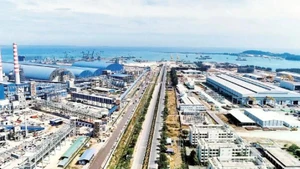In the structure of budget revenue in the first half of 2025, domestic revenue reached 373.9 trillion VND, fulfilling 77.5% of the target and rising by 52.7% year on year; revenue from import-export activities stood at 16.4 trillion VND, fulfilling 60% and increasing by 36.2%. Several key revenue streams within domestic revenue recorded strong growth, such as revenue from foreign-invested enterprises reaching 18.7 trillion VND (61.6% of target, up 13.7%), revenue from non-state enterprises reaching 77.3 trillion VND (73% of target, up 44.2%), and land use fees totalling 72.5 trillion VND (151.2% of target, 6.9 times higher than the same period in 2024).
The increase in budget revenue also reflects Ha Noi’s economic growth momentum. In the first half of 2025, the city’s gross regional domestic product (GRDP) is estimated to have increased by 7.63% compared to the same period last year, with the first quarter up 7.56% and the second quarter up 7.69%. It is assessed that, in the context of complex and unpredictable global economic developments, difficulties in exports, and stagnation in domestic purchasing power, this growth rate — which is higher than both the same period last year (6.13%) and the projected scenario (7.59%) — is highly meaningful and commendable.
This result reflects the efforts of Ha Noi’s tax sector in strictly and resolutely implementing measures to enhance tax administration, tightly control revenue sources, strengthen anti-tax evasion efforts, simplify administrative procedures, adopt digital transformation, apply AI technology in management, and promote communication and support for taxpayers. Notably, this year, the tax sector has launched a high-intensity campaign to manage household and individual business taxes, with many measures to support and guide policy and administrative procedures.
The tax sector has advised local authorities and strengthened coordination with relevant agencies in state management. Through on-site surveys and data capture, the database for managing household and individual businesses has been updated to a coverage rate of 95%.
As of June 2025, Ha Noi’s tax sector is managing 325,211 business households. Innovative solutions have been deployed, such as using big data to manage household businesses, enhancing electronic invoice risk control, and building a digital ecosystem to effectively serve and support taxpayers. On this basis, the city has successfully implemented the government’s Decree No. 70/2025/ND-CP on electronic invoices generated from cash registers.
In a short period, over 9,000 business households have registered to use this system, achieving more than 180% of the assigned target. Le Thi Ngoc Ha, owner of a grocery store in Alley 537, Bat Khoi Street, Long Bien Ward, shared: “Initially, I was quite confused when implementing the new tax regulations for household businesses. Thanks to the guidance of tax officers, I have now implemented everything correctly.”
In addition to maintaining continuous and comprehensive support for taxpayers, the city’s tax authority is also actively reorganising and streamlining its apparatus in line with the two-tier local government model, ensuring efficient operations while avoiding disruption of public services and maximising convenience for taxpayers. Since July 1, all units and agencies under Ha Noi Tax Department have been operating in a smooth and effective manner under the new model, promptly resolving administrative procedures.
The second half of 2025 is the acceleration phase to achieve the annual goals. Faced with an increasing workload, Vu Manh Cuong, Deputy Director of the Tax Department and Head of Tax Division Area 1 (in charge of Ha Noi), stated that the unit will continue to stabilise its organisational structure and operate effectively under the two-tier local government model, ensuring seamless tax administration. The tax sector will proactively track budget revenue targets and comprehensively cover all sources of revenue, especially e-commerce business activities, while focusing on nurturing sustainable revenue sources and expanding the tax base.
















